- Home
- Albert Camus
The plague Page 10
The plague Read online
Page 10
Rieux was dumbfounded, and, to add to his amazement, he saw, or seemed to see, the man beside him making as if to take off his hat with a sweeping gesture, bringing his hand to his head, then holding his arm out straight in front of him. That queer whistling overhead seemed to gather force.
"So you see," Grand added, "it's got to be flawless."
Though he knew little of the literary world, Rieux had a suspicion that things didn't happen in it quite so picturesquely—that, for instance, publishers do not keep their hats on in their offices. But, of course, one never can tell, and Rieux preferred to hold his peace. Try as he might to shut his ears to it, he still was listening to that eerie sound above, the whispering of the plague. They had reached the part of the town where Grand lived and, as it was on a slight eminence, they felt the cool night breeze fanning their cheeks and at the same time carrying away from them the noises of the town.
Grand went on talking, but Rieux failed to follow all the worthy man was saying. All he gathered was that the work he was engaged on ran to a great many pages, and he was at
almost excruciating pains to bring it to perfection. "Evenings, whole weeks, spent on one word, just think! Sometimes on a mere conjunction!"
Grand stopped abruptly and seized the doctor by a button of his coat. The words came stumbling out of his almost toothless mouth.
"I'd like you to understand, doctor. I grant you it's easy enough to choose between a 'but' and an 'and.' It's a bit more difficult to decide between 'and' and 'then.' But definitely the hardest thing may be to know whether one should put an 'and' or leave it out."
"Yes," Rieux said, "I see your point."
He started walking again. Grand looked abashed, then stepped forward and drew level.
"Sorry," he said awkwardly. "I don't know what's come over me this evening."
Rieux patted his shoulder encouragingly, saying he'd been much interested in what Grand had said and would like to help him. This seemed to reassure Grand, and when they reached his place he suggested, after some slight hesitation, that the doctor should come in for a moment. Rieux agreed.
They entered the dining-room and Grand gave him a chair beside a table strewn with sheets of paper covered with writing in a microscopic hand, criscrossed with corrections.
"Yes, that's it," he said in answer to the doctor's questioning glance. "But won't you drink something? I've some wine."
Rieux declined. He was bending over the manuscript.
"No, don't look," Grand said. "It's my opening phrase, and it's giving trouble, no end of trouble."
He too was gazing at the sheets of paper on the table, and his hand seemed irresistibly drawn to one of them. Finally he picked it up and held it to the shadeless electric bulb so that the light shone through. The paper shook in his hand and Rieux noticed that his forehead was moist with sweat.
"Sit down," he said, "and read it to me."
"Yes." There was a timid gratitude in Grand's eyes and smile. "I think I'd like you to hear it."
He waited for a while, still gazing at the writing, then sat down. Meanwhile Rieux was listening to the curious buzzing sound that was rising from the streets as if in answer to the soughings of the plague. At that moment he had a preternaturally vivid awareness of the town stretched out below, a victim world secluded and apart, and of the groans of agony stifled in its darkness. Then, pitched low but clear, Grand's voice came to his ears.
"One fine morning in the month of May an elegant young horsewoman might have been seen riding a handsome sorrel mare along the flowery avenues of the Bois de Boulogne."
Silence returned, and with it the vague murmur of the prostrate town. Grand had put down the sheet and was still staring at it. After a while he looked up.
"What do you think of it?"
Rieux replied that this opening phrase had whetted his curiosity; he'd like to hear what followed. Whereat Grand told him he'd got it all wrong. He seemed excited and slapped the papers on the table with the flat of his hand.
"That's only a rough draft. Once I've succeeded in rendering perfectly the picture in my mind's eye, once my words have the exact tempo of this ride—the horse is trotting, one-two-three, one-two-three, see what I mean?—the rest will come more easily and, what's even more important, the illusion will be such that from the very first words it will be possible to say: 'Hats off!'>:
But before that, he admitted, there was lots of hard work to be done. He'd never dream of handing that sentence to the printer in its present form. For though it sometimes satisfied him, he was fully aware it didn't quite hit the mark as yet, and also that to some extent it had a facility of tone approximating, remotely perhaps, but recognizably, to the commonplace. That was more or less what he was saying
when they heard the sound of people running in the street below the window. Rieux stood up.
"Just wait and see what I make of it," Grand said, and, glancing toward the window, added: "When all this is over."
But then the sound of hurried footsteps came again. Rieux was already halfway down the stairs, and when he stepped out into the street two men brushed past him. They seemed to be on their way to one of the town gates. In fact, what with the heat and the plague, some of our fellow citizens were losing their heads; there had already been some scenes of violence and nightly attempts were made to elude the sentries and escape to the outside world.
O
Thers, too, Rambert for example, were trying to escape from this atmosphere of growing panic, but with more skill and persistence, if not with greater success. For a while Rambert had gone on struggling with officialdom. If he was to be believed, he had always thought that perseverance would win through, inevitably, and, as he pointed out, resourcefulness in emergency was up his street, in a manner of speaking. So he plodded away, calling on all sorts of officials and others whose influence would have had weight in normal conditions. But, as things were, such influence was unavailing. For the most part they were men with well-defined and sound ideas on everything concerning exports, banking, the fruit or wine trade; men of proved ability in handling problems relating to insurance, the interpretation of ill-drawn contracts, and the like; of high qualifications and evident good intentions. That, in fact, was
what struck one most—the excellence of their intentions. But as regards plague their competence was practically nil.
However, whenever opportunity arose, Rambert had tackled each of them and pleaded his cause. The gist of his argument was always the same: that he was a stranger to our town and, that being so, his case deserved special consideration. Mostly the men he talked to conceded this point readily enough. But usually they added that a good number of other people were in a like case, and thus his position was not so exceptional as he seemed to suppose. To this Rambert could reply that this did not affect the substance of his argument in any way. He was then told that it did affect the position, already difficult, of the authorities, who were against showing any favoritism and thus running the risk of creating what, with obvious repugnance, they called "a precedent."
In conversation with Dr. Rieux, Rambert classified the people whom he had approached in various categories. Those who used the arguments mentioned above he called the sticklers. Besides these there were the consolers, who assured him that the present state of things couldn't possibly last and, when asked for definite suggestions, fobbed him off by telling him he was making too much fuss about a passing inconvenience. Then there were the very important persons who asked the visitor to leave a brief note of his case and informed him they would decide on it in due course; the triflers, who offered him billeting warrants or gave the addresses of lodgings; the red-tape merchants, who made him fill up a form and promptly interred it in a file; overworked officials, who raised their arms to heaven, and much-harassed officials who simply looked away; and, finally, the traditionalists—these were by far the greatest number—who referred Rambert to another office or recommended some new method of approach.
These fruitless
interviews had thoroughly worn out the journalist; on the credit side he had obtained much insight
into the inner workings of a municipal office and a Prefect's headquarters, by dint of sitting for hours on imitation-leather sofas, confronted by posters urging him to invest in savings bonds exempt from income-tax, or to enlist in the colonial army; and by dint of entering offices where human faces were as blank as the filing-cabinets and the dusty records on the shelves behind them. The only thing gained by all this expenditure of energy, Rambert told Rieux with a hint of bitterness, was that it served to keep his mind off his predicament. In fact, the rapid progress of the plague practically escaped his notice. Also, it made the days pass more quickly and, given the situation in which the whole town was placed, it might be said that every day lived through brought everyone, provided he survived, twenty-four hours nearer the end of his ordeal. Rieux could but admit the truth of this reasoning, but to his mind its truth was of rather too general an order.
At one moment Rambert had a gleam of hope. A form was sent him from the Prefect's office with instructions that he was to fill in carefully all the blanks. It included questions concerning his identity, his family, his present and former sources of income; in fact, he was to give what is known as a.curriculum vitae. He got an impression that inquiries were on foot with a view to drawing up a list of persons who might be instructed to leave the town and return to their homes. Some vague information gleaned from an employee in one of the offices confirmed this impression. But on going further into the matter and finally discovering the office from which the form had emanated, he was told that this information was being collected with a view to certain contingencies.
"What contingencies?" he asked.
He then learned that the contingency was the possibility of his falling ill and dying of plague; the data supplied would enable the authorities to notify his family and also to decide if the hospital expenses should be borne by the municipality
or if, in due course, they could be recovered from his relatives. On the face of it this implied that he was not completely cut off from the woman who was awaiting his return, since the powers that be were obviously giving heed to both of them. But that was no consolation. The really remarkable thing, and Rambert was greatly struck by this, was the way in which, in the very midst of catastrophe, offices could go on functioning serenely and take initiatives of no immediate relevance, and often unknown to the highest authority, purely and simply because they had been created originally for this purpose.
The next phase was at once the easiest and the hardest for Rambert. It was a period of sheer lethargy. He had gone the round of-offices, taken every step that could be taken, and realized that for the present all avenues of that kind were closed to him. So now he drifted aimlessly from cafe to cafe. In the mornings he would sit on the terrace of one of them and read a newspaper in the hope of finding some indication that the epidemic was on the wane. He would gaze at the faces of the passers-by, often turning away disgustedly from their look of unrelieved gloom, and after reading for the nth time the shopsigns on the other side of the street, the advertisements of popular drinks that were no longer procurable, would rise and walk again at random in the yellow streets. Thus he killed time till nightfall, moving about the town and stopping now and then at a cafe or restaurant. One evening Rieux noticed him hovering round the door of a cafe, unable to make up his mind to enter. At last he decided to go in and sat down at a table at the back of the room. It was the time when, acting under orders, cafe-proprietors deferred as long as possible turning on their lights. Gray dusk was seeping into the room, the pink of sunset glowed in the wall mirrors, and the marble-topped tables glimmered white in the gathering darkness. Seated in the empty cafe, .Rambert looked pathetically lost, a mere shade among the shadows, and Rieux guessed this was the
hour when he felt most derelict. It was, indeed, the hour of day when all the prisoners of the town realized their dereliction and each was thinking that something, no matter what, must be done to hasten their deliverance. Rieux turned hurriedly away.
Rambert also spent a certain amount of time at the railroad station. No one was allowed on the platforms. But the waiting-rooms, which could be entered from outside, remained open and, being cool and dark, were often patronized by beggars on very hot days. Rambert spent much time studying the timetables, reading the prohibitions against spitting, and the passengers' regulations. After that he sat down in a corner. An old cast-iron stove, which had been stone-cold for months, rose like a sort of landmark in the middle of the room, surrounded by figure-of-eight patterns on the floor, the traceries of long-past sprinklings. Posters on the walls gaily invited tourists to a carefree holiday at Cannes or Bandol. And in his corner Rambert savored that bitter sense of freedom which comes of total deprivation. The evocations which at that time he found most poignant were—anyhow according to what he told Rieux—those of Paris. There rose before his eyes, unsummoned, vistas of old stones and riverbanks, the pigeons of the Palais-Royal, the Gare du Nord, quiet old streets round the Pantheon, and many another scene of the city he'd never known he loved so much, and these mental pictures killed all desire for any form of action. Rieux felt fairly sure he was identifying these scenes with memories of his love. And when one day Rambert told him that he liked waking up at four in the morning and thinking of his beloved Paris, the doctor guessed easily enough, basing this on his own experience, that that was his favorite time for conjuring up pictures of the woman from whom he now was parted. This was, indeed, the hour when he could feel surest she was wholly his. Till four in the morning one is seldom doing anything and at that hour, even if the night has been a night of betrayal,
one is asleep. Yes, everyone sleeps at that hour, and this is reassuring, since the great longing of an unquiet heart is to possess constantly and consciously the loved one, or, failing that, to be able to plunge the loved one, when a time of absence intervenes, into a dreamless sleep timed to last unbroken until the day they meet again.
S
hortly after Father Paneloux's sermon the hot weather set in with a vengeance. On the day following the unseasonable downpour of that Sunday, summer blazed out above the housetops. First a strong, scorching wind blew steadily for a whole day, drying up the walls. And then the sun took charge, incessant waves of heat and light swept the town daylong, and but for arcaded streets and the interiors of houses, everything lay naked to the dazzling impact of the light. The sun stalked our townsfolk along every byway, into every nook; and when they paused, it struck.
Since this first onslaught of the heat synchronized with a startling increase in the number of victims—there were now nearly seven hundred deaths a week—a mood of profound discouragement settled on the town. In the suburbs little was left of the wonted animation between the long flat streets and the terraced houses; ordinarily people living in these districts used to spend the best part of the day on their doorsteps, but now every door was shut, nobody was to be seen, even the Venetian blinds stayed down, and there was no knowing if it was the heat or the plague that they were trying to shut out. In some houses groans could be heard. At first, when that happened, people often gathered outside
and listened, prompted by curiosity or compassion. But under the prolonged strain it seemed that hearts had toughened; people lived beside those groans or walked past them as though they had become the normal speech of men.
As a result of the fighting at the gates, in the course of which the police had had to use their revolvers, a spirit of lawlessness was abroad. Some had certainly been wounded in these brushes with the police, but in the town, where, owing to the combined influences of heat and terror, everything was exaggerated, there was talk of deaths. One thing, anyhow, was certain; discontent was on the increase and, fearing worse to come, the local officials debated lengthily on the measures to be taken if the populace, goaded to frenzy by the epidemic, got completely out of hand. The newspapers published new regulations reiterating the orders against atte
mpting to leave the town and warning those who infringed them that they were liable to long terms of imprisonment.
A system of patrols was instituted and often in the empty, sweltering streets, heralded by a clatter of horse hoofs on the cobbles, a detachment of mounted police would make its way between the parallel lines of close-shut windows. Now and again a gunshot was heard; the special brigade recently detailed to destroy cats and dogs, as possible carriers of infection, was at work. And these whipcrack sounds startling the silence increased the nervous tension already existing in the town.
For in the heat and stillness, and for the troubled hearts of our townsfolk, anything, even the least sound, had a heightened significance. The varying aspects of the sky, the very smells rising from the soil that mark each change of season, were taken notice of for the first time. Everyone realized with dismay that hot weather would favor the epidemic, and it was clear that summer was setting in. The cries of swifts in the evening air above the housetops were growing shriller. And the sky, too, had lost the spaciousness of those
June twilights when our horizons seem infinitely remote. In the markets the flowers no longer came in buds; they were already in full bloom, and after the morning's marketing the dusty pavements were littered with trampled petals. It was plain to see that spring had spent itself, lavished its ardor on the myriads of flowers that were bursting everywhere into bloom, and now was being crushed out by the twofold onslaught of heat and plague. For our fellow citizens that summer sky, and the streets thick in dust, gray as their present lives, had the same ominous import as the hundred deaths now weighing daily on the town. That incessant sunlight and those bright hours associated with siesta or with holidays no longer invited, as in the past, to frolics and flirtation on the beaches. Now they rang hollow in the silence of the closed town, they had lost the golden spell of happier summers. Plague had killed all colors, vetoed pleasure.

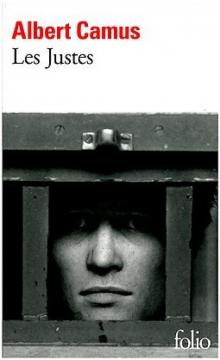 Les Justes
Les Justes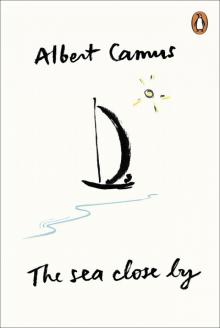 The Sea Close By
The Sea Close By The Stranger
The Stranger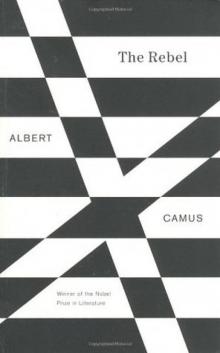 The Rebel: An Essay on Man in Revolt
The Rebel: An Essay on Man in Revolt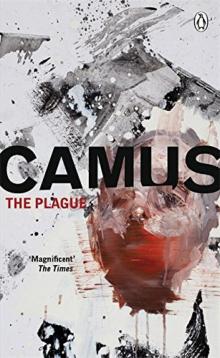 The plague
The plague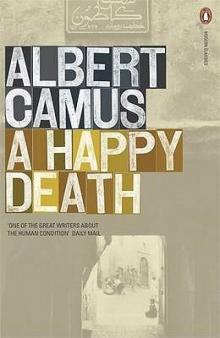 A Happy Death
A Happy Death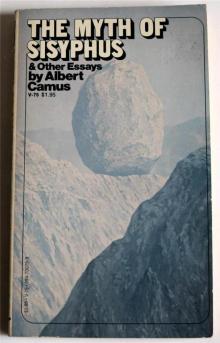 The Myth of Sisyphus and Other Essays
The Myth of Sisyphus and Other Essays The Fall
The Fall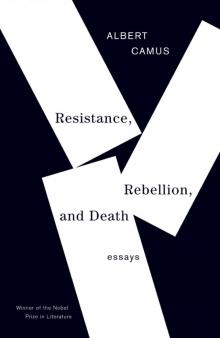 Resistance, Rebellion, and Death
Resistance, Rebellion, and Death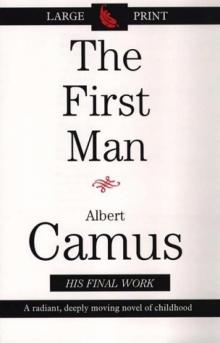 The First Man
The First Man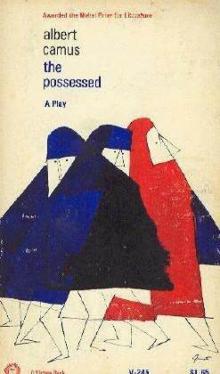 The Possessed
The Possessed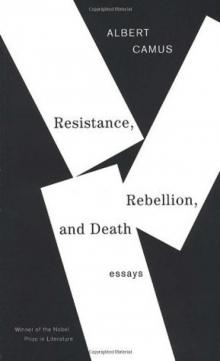 Resistance, Rebellion and Death: Essays
Resistance, Rebellion and Death: Essays